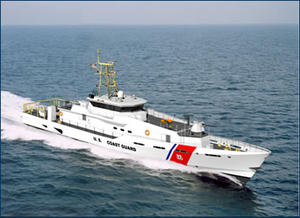Follow the moneyU.S. Coast Guard spent $7 million in unauthorized funds
A DHS Inspector General’s investigation has revealed that the U.S. Coast Guard has spent more than $7 million in unauthorized funds to modernize its fast response boats; the Coast Guard violated the Anti-Deficiency Act (ADA) twenty times between 2004 and 2009; the act outlaws the unauthorized use of federal funds and violators can face large fines and even jail time

Rendering of the Sentinel class fast response cutter // Source: dodlive.mil
A DHS Inspector General’s investigation has revealed that the U.S. Coast Guard has spent more than $7 million in unauthorized funds to modernize its fast response boats.
According to the Inspector General, the Coast Guard violated the Anti-Deficiency Act (ADA) twenty times between 2004 and 2009. The act outlaws the unauthorized use of federal funds and violators can face large fines and even jail time.
The investigation was launched at the behest of the Coast Guard in 2009 to examine the service’s fast response boat medium project which is part of the larger Integrated Deepwater System, the troubled twenty-five year plan to update its aging fleet of ships and aircraft.
The Inspector General initially found $7.8 million in potential violations, but a more detailed audit eventually lowered that amount by $800,000 after the service issued a stop-work order.
DHS investigators found twenty ADA violations stemming from a “lack of Coast Guard acquisition policies, procedures and training, which resulted in unallowable use of appropriations for design changes.”
The investigation revealed that changes to the program had been made in 2006 after the contract to begin construction on the boats had started resulting in charges that were not in the original contract.
The changes were “incorrectly charged to current year funding rather than to appropriations used for the original boat delivery order,” the report said.
In response to the Inspector General’s report, the Coast Guard has made appropriations law training mandatory for its acquisition staff, funds managers and contracts officer. The service hopes that the additional training will ensure that personnel understand guidelines and requirements for appropriations. In addition the Coast Guard now also requires an secondary review of all large acquisitions by its office of resource management.
The Deepwater program has been plagued with cost overruns and delays which prompted the service to reorganize the program in 2007. The Coast Guard had given the project’s lead contractor Integrated Coast Guard Systems LLC, a Lockheed Martin-Northrop Grumman joint venture, too much oversight of the project.
To get the project on track, the Coast Guard made efforts to build up its own acquisition force and hire personnel with expertise in overseeing shipbuilding contracts.
The Coast Guard’s reforms do not change the fact that it still owes an estimated $1 million to one of its contractors and lacks the funding to pay for the$7 million that was erroneously charged.
The Coast Guard began plans to acquire new fast response boats in 2002 to replace its fleet of aging forty-one foot utility boats. The new boats were designed to be capable of travelling farther and faster for search and rescue, security, and drug interdiction operations at a cost of $2 million per boat.
